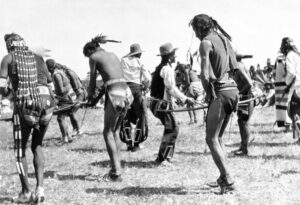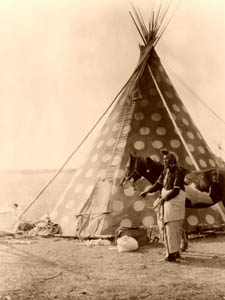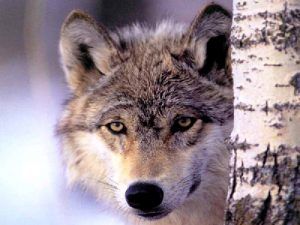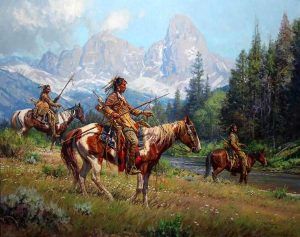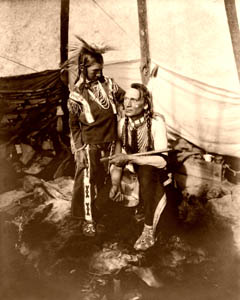By George Bird Grinnell, 1913
The chief god of the Blackfeet is the Sun. He made the world and ruled it, and to him, the people pray. One of his names is Napi—old man, but there is another Napi who is very different from the Sun. Instead of being great, wise, and wonderful, he is foolish, mean, and contemptible. We shall hear about him further on.
Every year in summer, when the berries ripen, the Blackfeet used to hold the great festival and sacrifice, which we call the Medicine Lodge Ceremony. This was a time of happy meetings, feasting, and giving presents, but besides this rejoicing, those men who wished to have good luck in whatever they might undertake tried to prove their prayers sincere by sacrificing their bodies, torturing themselves in ways that caused great suffering. In ancient times, as we are told in books of history, things like that happened among many people worldwide.
Soon after, the Raven Bearers held a dance. They all painted themselves nicely and wore their finest ornaments, and each one tried to dance the best. Afterward, some of them asked for this girl, but she said, “No.” After that, the Bulls, the Kit-Foxes, and others of the All Comrades held their dances, and many rich men and some great warriors asked this man for his daughter, but to everyone, she said, “No.”
Then her father was angry, and he said, “Why is this? All the best men have asked for you, and still, you say ‘No.'” Then the girl said, “Father, listen to me. That Above Person, the Sun, said to me,
‘Do not marry any of these men, for you belong to me. Listen to what I say, and you shall be happy and live to a great age.’ And again he said to me, ‘Take heed, you must not marry; you are mine.'”
“Ah!” replied her father; “it must always be as he says,” and they spoke no more about it.
There was a poor young man—very poor. His father, his mother, and all his relatives were dead. He had no lodge, no wife to tan his robes or make his moccasins. His clothes were always old and worn. He had no home. Today, he stopped in one lodge; then, tomorrow, he ate and slept in another. Thus, he lived. He had a good face but a bad scar on his cheek.
After they had held those dances, some of the young men met this poor Scarface, and they laughed at him and said, “Why do not you ask that girl to marry you? You are so rich and handsome.” Scarface did not laugh. He looked at them and said, “I will do as you say; I will go and ask her.”
All the young men thought this was funny; they laughed a lot at Scarface as he walked away.
Scarface went down by the river and waited near the place where the women went to get water. By and by, the girl came there. Scarface spoke to her and said, “Girl, stop; I want to speak with you. I do not wish to do anything secretly, but I speak to you here openly, where the Sun looks down, and all may see.”
“Speak, then,” said the girl.
“I have seen the days,” said Scarface. “I have seen how you have refused all those men who are young and rich and brave. Today, some of these young men laughed and asked me, ‘Why don’t you ask her?’ I am poor. I have no lodge, no food, no clothes, no robes. I have no relations. All of them have died. Yet now, today, I say to you, take pity. Be my wife.”
The girl hid her face in her robe and brushed the ground with the point of her moccasin, back and forth, back and forth, for she was thinking.
After a time, she spoke and said, “I have indeed refused all those rich young men, yet now a poor one asks me, and I am glad. I will be your wife, and my people will be glad. You are poor, but that does not matter. My father will give you dogs; my mother will make us a lodge; my relations will give us robes and furs; you will no longer be poor.”
Then the young man was glad, and he started forward to kiss her, but she put out her hand and held him back and said, “Wait; the Sun has spoken to me. He said I may not marry, that I belong to him, that if I listen to him, I shall live to a great age. So now I say, go to the
Sun, say to him, ‘She whom you spoke with has listened to your words; she has never done wrong, but now she wants to marry. I want her for my wife.’ Ask him to take that scar from your face; that will be his sign, and I shall know he is pleased. But if he refuses, or if you cannot find his lodge, then do not return to me.”
“Oh!” cried Scarface; “at first, your words were good. I was glad. But now it is dark. My heart is dead. Where is that far-off lodge? Where is the trail that no one yet has traveled?”
“Take courage, take courage,” said the girl softly, and she went on to her lodge.
Scarface was very unhappy. He did not know what to do. He sat down, covered his face with his robe, and tried to think. At length, he stood up and went to an old woman who had been kind to him. He said to her, “Pity me. I am very poor. I am going away, on a long journey. Make me some moccasins.”
“Where are you going–far from the camp?” asked the old woman.
“I do not know where I am going,” he replied; “I am in trouble, but I cannot talk about it.”
This old woman had a kind heart. She made him seven pairs of moccasins and gave him a sack of food—pemmican, dried meat, and back fat.
All alone and with a sad heart, Scarface climbed the bluff overlooking the valley. When he had reached the top, he turned to look back at the camp. He wondered if he should ever see it again if he should return to the girl and the people.
“Pity me, O Sun!” he prayed, and turning away, he set off to look for the trail to the Sun’s lodge.
For many days, he went on. He crossed great prairies, followed timbered rivers, and crossed the mountains. Every day, his sack of food grew lighter, but as he went along, he looked for berries and roots, and sometimes, he killed an animal. These things gave him food.
One night, he came to the home of a wolf. “Hah!” said the wolf; “what are you doing so far from your home?”
“I am looking for the place where the Sun lives,” replied Scarface. “I have been sent to speak with him.”
“I have traveled over much country,” said the wolf. I know all the prairies, the valleys, and the mountains, but I have never seen the Sun’s home. But wait a moment. I know a very wise person who may be able to tell you the road. Ask the bear.”
The next day, Scarface went on again, stopping now and then to rest and pick berries, and when night came, he was at the bear’s lodge.
“Where is your home?” asked the bear. “Why are you traveling so far alone?”
“Ah,” replied the man, “I have come to you for help. Pity me. Because of what that girl said to me, I am looking for the Sun. I wish to ask him for her.”
“I do not know where he lives,” said the bear. “I have traveled by many rivers, and I know the mountains, yet I have not seen his lodge. Farther on, there is someone–that striped face–who knows a great deal; ask him.”
When the young man got there, the badger was in his hole. But Scarface called to him, “Oh, cunning striped face! I wish to speak with you.”
The badger lifted his head from the hole and said, “What do you want, my brother?”
“I wish to find the Sun’s home,” said Scarface. “I wish to speak with him.”
“I do not know where he lives,” answered the badger. “I never travel very far. Over there in the timber is the wolverine. He is always traveling about and knows many things. Perhaps he can tell you.”
Scarface went over to the forest and looked all about for the wolverine but could not see him, so he sat down on a log to rest. “Alas, alas!” he cried; “wolverine, take pity on me. My food is gone; my moccasins are worn out; I fear I shall die.”
Someone close to him said, “What is it, my brother?” and looking around, he saw the wolverine sitting there.
“She whom I wish to marry belongs to the Sun,” said Scarface; “I am trying to find where he lives so that I may ask him for her.”
“Ah,” said the wolverine, “I know where he lives. It is nearly night now, but tomorrow I will show you the trail to the big water. He lives on the other side of it.”
Early in the morning, they set out, and the wolverine showed Scarface the trail, and he followed it until he came to the water’s edge. When he looked out over it, his heart almost stopped. Never before had anyone seen such great water. The other side could not be seen, and there was no end to it. Scarface sat down on the shore. This seemed the end. His food was gone; his moccasins were worn out; he had no longer strength or courage; his heart was sick. “I cannot cross this great water,” he said. “I cannot return to the people. Hereby this water, I shall die.”
Yet, even as he thought this, helpers were near. Two swans came swimming up to the shore and said to him, “Why have you come here?
What are you doing? It is very far to the place where your people live.”
“I have come here to die,” replied Scarface. “Far away in my country is a beautiful girl. I want to marry her, but she belongs to the Sun, so I set out to find him and ask him for her. I have traveled many days. My food is gone. I cannot go back; I cannot cross this great water, so I must die.”
“No,” said the swans, “it shall not be so. Across this water is the home of that Above Person. Get on our backs, and we will take you there.”
Scarface stood up. Now, he felt strong and full of courage. He waded out into the water and lay down on the swans’ backs, and they swam away. It was a fearful journey, for that water was deep and black, and in it lived strange people and great animals which might reach up and seize a person and pull him down under the water; yet the swans carried Scarface safely to the other side. A broad, hard trail led back from the water’s edge.
“There,” said the swans, “you are now close to the Sun’s lodge. Follow that trail, and soon you will see it.”
Scarface started walking along the trail, and after he had gone a little, he came to some beautiful things lying on the trail. There was a war shirt, a shield, a bow, and a quiver of arrows. He had never seen such fine weapons. He looked at them, but he did not touch them, and at last, walked around them and went on. A little farther along, he met a very handsome young man. His hair was long; his clothing was made of strange skins, and his moccasins were sewed with bright feathers.
The young man spoke to him and asked, “Did you see some weapons lying in the trail?”
“Yes,” replied Scarface, “I saw them.”
“Did you touch them?” said the young man.
“No,” said Scarface, “I supposed someone had left them there, and I did not touch them.”
“You do not meddle with the property of others,” said the young man. What is your name, and where are you going?” Scarface told him. Then, the young man said, “My name is Early Riser (the morning star). The Sun is my father. Come, I will take you to our lodge. My father is not home now but will return at night.”
At length, they came to the lodge. It was large and handsome, and on it were painted strange medicine animals. The Sun’s weapons and war clothing were on a tripod behind the lodge. Scarface was ashamed to enter the lodge, but Morning Star said, “Friend, do not be afraid; we are glad you have come.”
When they went in, a woman, the Moon, the Sun’s wife and the mother of Morning Star, was sitting there. She spoke to Scarface kindly and gave him food to eat, and when he had eaten, she asked, “Why have you come so far from your people?”
So Scarface told her about the beautiful girl he wished to marry and said, “She belongs to the Sun. I have come to ask him for her.”
When it was almost night and time for the Sun to come home, the Moon hid Scarface under a pile of robes. When the Sun reached the doorway, he said, “A strange person is here.”
“Yes, father,” said Morning Star, “a young man has come to see you. He is a good young man, for he found some of my things in the trail and did not touch them.”
Scarface emerged from under the robes, and the Sun entered the lodge and sat down. He spoke to Scarface, saying, “I am glad you have come to our lodge. Stay with us as long as you like. Sometimes, my son is lonely. Be his friend.”
The next day, the two young men were talking about going hunting, and the Moon spoke to Scarface and said, “Go with my son where you like but do not hunt near that big water. Do not let him go there. That is the home of great birds with long, sharp bills. They kill people. I have had many sons, but these birds have killed them all. Only Morning Star is left.”
Scarface stayed a long time in the Sun’s lodge and every day went hunting with Morning Star. One day, they came near the water and saw the big birds.
“Come on,” said Morning Star, “let us go and kill those birds.”
“No, no,” said Scarface, “we must not go there. Those are terrible birds; they will kill us.”
Morning Star would not listen. He ran toward the water, and Scarface ran after him, knowing that he must kill the birds and save the boy’s life. He ran ahead of Morning Star, met the birds coming to fight, and killed every one of them with his spear; not one was left. The young men cut off the birds’ heads and carried them home, and when Morning Star’s mother heard what they had done and they showed her the birds’ heads, she was glad. She cried over the two young men and called Scarface “My son,” and when the Sun came home at night, she told him about it, and he too was glad. “My son,” he said to Scarface, “I will not forget what you have this day done for me. Tell me now what I can do for you; what is your trouble?”
“Alas, alas!” replied Scarface, “Pity me. I came here to ask you for that girl. I want to marry her. I asked her, and she was glad, but she said she belonged to you, and you told her not to marry.”
“What you say is true,” replied the Sun. “I have seen the days and all that she has done. Now I give her to you. She is yours. I am glad that she has been wise, and I know that she has never done wrong. The Sun cares for good women; they shall live a long time, and so shall their husbands and children.
“Now, soon, you will go home. I wish to tell you something; you must be wise and listen. I am the only chief; everything is mine. I made the earth, the mountains, the prairies, the rivers, and the forests; I made the people and all the animals. This is why I say that I alone am chief. I can never die. The winter makes me old and weak, but I grow young again every summer.
“What one of all the animals is the smartest?” the Sun said. “It is the raven, for he always finds food and is never hungry. Which one of all the animals is the most to be reverenced? It is the buffalo; of all the animals, I like him best. He is for the people; he is your food and your shelter. What part of his body is sacred? It is the tongue that belongs to me. What else is sacred? Berries. They, too, are mine. Come with me now and see the world.”
The Sun took Scarface to the sky’s edge, and they looked down and saw the world. It is flat and round, and all around the edge, it goes straight down. Then said the Sun, “If any man is sick or in danger, his wife may promise to build me a lodge if he recovers. If the woman is good, then I shall be pleased and help the man; but if she is not good or lies, I shall be angry. You shall build the lodge like the world, round, with walls, but first, you must build a 100-stick sweat lodge. It shall be arched like the sky, and one-half of it shall be painted red for me; the other half you shall paint black for the night.” He told Scarface all about making the Medicine Lodge, and when he had finished
speaking, he rubbed some medicine on the young man’s face, and the scar that had been there disappeared. He gave him two raven feathers, saying: “These are a sign for the girl that I give her to you. They must always be worn by the husband of the woman who builds a Medicine Lodge.”
Now Scarface was ready to return home. The Sun and Morning Star gave him many good presents; the Moon cried, kissed him, and was sorry to see him go. Then, the Sun showed him the short trail. It was the Wolf Road–the Milky Way. He followed it and soon reached the ground.
It was a very hot day. All the lodge skins were raised, and the people sat in the shade. There was a very generous chief who, all day long, was calling out for feasts, and people kept coming to his lodge to eat and smoke with him. Early in the morning, this chief saw a person sitting on a butte nearby, close-wrapped in his robe. All day long, this person sat there and did not move. When it was almost night, the chief said, “That person has sat there all day in the strong heat, and he has not eaten nor drunk. Perhaps he is a stranger. Go and ask him to come to my lodge.”
Some young men ran up to the person and said to him, “Why have you sat here all day in the great heat? Come to the shade of the lodges.
The chief asks you to eat with him.” The person rose and threw off his robe, and the young men were surprised. He wore fine clothing; his bow, shield, and other weapons were of strange make, but they knew his face, although the scar was gone, and they ran ahead, shouting, “The Scarface poor young man has come. He is no longer poor. The scar on his face is gone.”
All the people hurried out to see him and to ask him questions. “Where did you get all these fine things?” He did not answer. There in the crowd stood that young woman, and, taking the two raven feathers from his head, he gave them to her and said, “The trail was long, and I nearly died, but by those helpers, I found his lodge. He is glad. He sends these feathers to you. They are the sign.”
Great was her gladness then. They were married and made the first Medicine Lodge, as the Sun had said. The Sun was glad. He gave them great age. They were never sick. When they were very old, one morning, their children called to them, “Awake, rise and eat.” They did not move.
In the night, together, in sleep, without pain, their shadows had departed to the Sandhills.

Blackfeet Tipis
By George Bird Grinnell, 1913. Compiled and edited by Kathy Alexander/Legends of America, updated April 2024.
Blackfeet Indians Stories was published by George Bird Grinnell in 1913 and is now in the public domain. George Bird Grinnell studied at Yale with an intense desire to be a naturalist. He talked his way onto a fossil-collecting expedition in 1870 and then served as the naturalist on Custer’s expedition to the Black Hills in 1874. Grinnell was interested in what he could learn from the Indian tribes of the region and, early on, was well known for his ability to get along with Indian elders. The Pawnee called him White Wolf and eventually adopted him into the tribe. Grinnell was also editor of Forest and Stream, the leading natural history magazine in North America, the founder of the Audubon Society and the Boone and Crockett Club, and an advisor to Theodore Roosevelt. Glacier National Park came about largely through his efforts. Grinnell also worked for fair and reasonable treaties with Native American tribes and preserving America’s wildlands and resources.
Also See:

